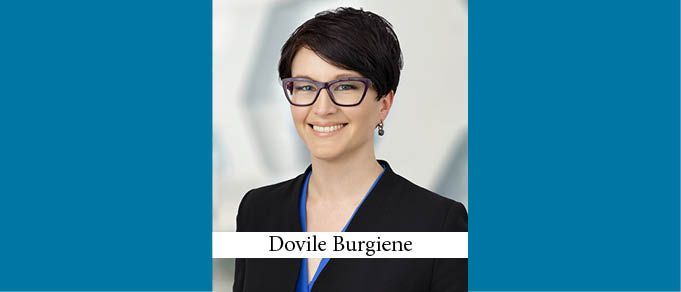According to Dovile Burgiene, Partner at Ellex Valiunas, last year was good year in Lithuania. "I think in terms of foreign investment there have been a lot of transactions,” she says, with “easy access to money and credit.”
Burgiene points to three specific areas of growth. First, she says, “one trend that’s very visible in the Baltics is that businesses are consolidating.” The most prominent examples, she says, include the merger in the summer of 2017 of the Baltic operations of Nordea and DNB Bank which resulted in the creation of Luminor Bank AS; Rimi Baltic's acquisition of Palink — the operator of the IKI retail chain — which is expected to close soon, and which will represent a merger of the second and fourth biggest retailers in Lithuania; and the Vienna Insurance Group’s December 18 acquisition of Seesam Insurance. "Business needs size to be competitive in the Baltics,” Burgiene says. In addition, she points to "exits to foreign investors,” reflecting “quite a lot of interest from European and even US buyers.”
"Another area that we follow from our corporate group,” Burgiene says, "is setting up foreign companies. And in Lithuania we have a lot of business outsourcing. A lot of foreign companies, usually IT-related.” That outsourcing does "not so much involve call centers, but things like IT centers or offices handing client information.” According to her, "Lithuania is trying to attract these investors, who often come from Scandinavia and Germany to open up large companies in Lithuania.” That business is “always up and down, but this year has been good, with many companies opening up in cities other than the capital."
The third source of business she points to is related to the Baltics’ reputation as a home of innovation in the tech sector. “There’s quite an active scene of startups and digital economy,” she says, "so FinTech is really growing. And our Central Bank is very attentive to payment institutions, and trying to attract companies that would have their headquarters here.”
While Burgiene is pleased with the state of the Lithuanian economy, she cautions that the Baltic markets are so small that the real drivers of growth are outside their control. “The downside is always the same,” she says. “The Baltics are very small and open economies, so we are very sensitive to crises in larger economies which we export to and trade with. There is no sign of crisis in the local economy, but that’s not really the source of most crises are anyway, as we have very open economies.” As a result, she says, she and her colleagues pay close attention to recent signs that Sweden may be facing economic problems, for instance. Still, she does not deny that "the sentiment is good."
Burgiene is hesitant to make a final pronouncement as to whether 2017 was “better” than the year before for her firm, noting that, “you can measure performance along a number of KPIs.” Still, she says, “2016 was a very very good year — and 2017 was the same. Financials are more or less the same, but we’ve worked on more interesting deals.” In particular, she says, “this year we’ve been able to enter several new areas, including Fintech and the GDPR, and Labor Law reform, for instance. Several areas of new products for us, so it’s been interesting."
Finally, Burgiene is asked about the news that former Glimstedt Partner Paulius Gruodis has joined her team this month. “We regularly meet other partners in the market,” she says, "and we met him on several deals, and we’ve seen that the clients he represents have few conflicts with ours, and he has good relationships with them, so he can bring his client portfolios and relationships with him.” She notes that the firm has restructured a bit, with one of its three M&A partners — Ramunas Petravicius — shifting responsibility to take over as Co-Chair of the Litigation Department, meaning that “we need more manpower on the highest level. This means it would be just the two of us, so we needed a third partner to give clients.” Thus, Burgiene says, the decision to invite Gruodis to join them involved “basically his client portfolio and his seniority and experience.” She smiles. “The legal market is a people business, and you need to be present. Two of us are not enough.”


















